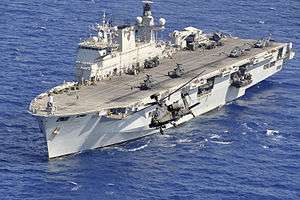Landing Platform Helicopter
_aft.jpg)
Landing Platform Helicopter (LPH) is the hull classification used by a number of the world's navies to designate a type of amphibious warfare ship designed primarily to operate as a launch and recovery platform for helicopters and other VTOL aircraft. As such, they are considered a type of helicopter carrier.
Under the NATO Standardisation Agreement (STANAG) document for reporting vessels, LPH is a short form designator used for "Amphibious Assault Ship, Helicopter" defined as a "large helicopter carrier" for carrying and deploying around 1,800 assault troops using its own aircraft, but for which use of landing craft is "not a principal function". For ships of this hull classification in the Royal Navy, LPH is a direct acronym for "Landing Platform Helicopter", while the United States Navy referred to its vessels within this classification as "Amphibious Assault Ships". Regardless of the terminology, all vessels classified as an LPH possess essentially similar capabilities.
The Royal Navy also used the term "Commando Carrier", which it applied to aircraft carriers converted to helicopter only operations. The RN now operates one vessel that it classifies as an LPH, HMS Ocean. Following the British government's decision to withdraw its Harrier aircraft at the end of 2010, the former light fleet carrier HMS Illustrious also performed this role, but has now been decommissioned.
The LPH classification was used by the United States Navy for the amphibious assault ships of the Iwo Jima class, a converted Casablanca-class escort carrier and three converted Essex-class aircraft carriers. No ships of this classification are currently in active service with the United States Navy, having been replaced with multi-purpose ships classified under NATO naming conventions as Landing Helicopter Dock or Landing Helicopter Assault ships.
Ships classified as LPH
Royal Navy
Royal Navy "Commando Carriers and "Amphibious Helicopter Carrier"s
- HMS Ocean (R68) – 1956 only, emergency minimal conversion for Suez Crisis Colossus-class aircraft carrier - Broken up
- HMS Theseus (R64) – 1956 only, emergency minimal conversion for Suez Crisis Colossus-class aircraft carrier - Broken up
- HMS Albion (R07) – 1962-1972 Converted Centaur-class aircraft carrier - Converted to a Commando carrier in 1961/62. Decommissioned 1972 and scrapped.
- HMS Bulwark (R08) – 1960-1980 Converted Centaur-class aircraft carrier. Converted to an anti-submarine warfare carrier 1979. Damaged by a fire, she was not fit for emergency use in the Falklands War and was later broken up.
- HMS Hermes (R12) – 1973-1976 Converted Centaur-class aircraft carrier after which she was equipped as a helicopter anti-submarine warfare carrier and later still as a Sea Harrier equipped VSTOL light carrier, which role continued after being sold to the Indian Navy.
- HMS Ocean (L12)[1] – 1998 Designed and built as a commando carrier based on the Invincible-class STOVL carrier hull. Currently in service.
- HMS Illustrious (R06) - Invincible-class aircraft carrier Equipped and tasked as a commando carrier while Ocean was in refit; now being decommissioned and intended to be preserved.
United States Navy
- USS Block Island (LPH-1) (formerly CVE-106) – Commencement Bay-class escort carrier – Conversion to LPH cancelled[2] -Scrapped
- USS Iwo Jima (LPH-2) – Iwo Jima-class amphibious assault ship – First ship to be designed and built from the keel up as an amphibious assault ship - Scrapped
- USS Okinawa (LPH-3) – Iwo Jima class - Sunk in SINKEX
- USS Boxer (LPH-4) (ex CV-21) – Converted straight deck Essex-class aircraft carrier - Scrapped
- USS Princeton (LPH-5) (ex CV-37) – Converted straight deck Essex-class aircraft carrier - Scrapped
- USS Thetis Bay (LPH-6) (ex CVE-90, ex CVHA-1) – Minimal conversion of a Casablanca-class escort carrier - Scrapped
- USS Guadalcanal (LPH-7) – Iwo Jima class - Sunk in SINKEX
- USS Valley Forge (LPH-8) (ex CV-45) – Converted straight deck Essex-class aircraft carrier - Scrapped
- USS Guam (LPH-9) – Iwo Jima class - Sunk in SINKEX
- USS Tripoli (LPH-10) – Iwo Jima class – As of 10 September 2011, towed hulk still on loan to the US Army for launching targets for THAAD missiles at the Pacific Missile Range Facility.
- USS New Orleans (LPH-11) – Iwo Jima class - Sunk in SINKEX off of the coast of Oahu, Hawaii.
- USS Inchon (LPH-12) – Iwo Jima class - Stricken from the list and sunk east of Virginia Beach, Virginia on 5 December 2004.
Republic of Korea Navy
_-_Invincible_Spirit.jpg)
- Dokdo-class amphibious assault ship
- ROKS Dokdo
- ROKS Marado
